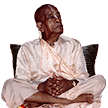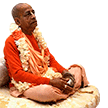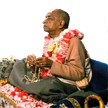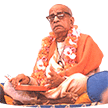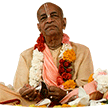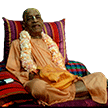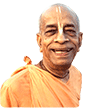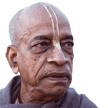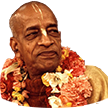Dharma - an essential subject: Difference between revisions
Visnu Murti (talk | contribs) (Created page with "Category:Essential Subjects <!----------------------- edit below this line -----------------------> <!------------------------ begin introduction text --------------------...") |
(Vanibot #0041: Moves Choose Another box to the end) |
||
| Line 2: | Line 2: | ||
<!----------------------- edit below this line -----------------------> | <!----------------------- edit below this line -----------------------> | ||
<!------------------------ begin introduction text ------------------------> | <!------------------------ begin introduction text ------------------------> | ||
A good citizen follows the laws of the state. Those who disobey those laws are known as outlaws. It is the duty of good citizens to abide by the laws of the state. To follow dharma means to follow the laws of holy scriptures. It is the duty of a dharmī, a person who is religious to abide by the laws of God. One who is not abiding, he is an adharmi. | |||
Srila Prabhupada's books, lectures, conversations and letters offer a comprehensive presentation of this essential subject as seen in the Vaniquotes '''[[Vaniquotes:Category:Dharma|Dharma]]''' category. An introduction from his books is given below in the following | Dharma is a basic principle principle for human civilization. If there is no dharma, then it is a society of animals. Dharma is meant only for human society. In animal societies there is no religion. They know not the difference between the body and the soul. It is not their business. | ||
Dharma is the business of the human beings. So real dharma, real religion is to become servant of God and render service to God. That is real religion. | |||
Srila Prabhupada's books, lectures, conversations and letters offer a comprehensive presentation of this essential subject as seen in the Vaniquotes '''[[Vaniquotes:Category:Dharma|Dharma]]''' category. An introduction from his books is given below in the following 11 quotes. | |||
<!-------- end introduction text and don't touch next three lines ---------> | <!-------- end introduction text and don't touch next three lines ---------> | ||
---- | ---- | ||
== Quotes from Srila Prabhupada's books == | == Quotes from Srila Prabhupada's books == | ||
<!----------------- edit quote boxes below this line -----------------> | <!----------------- edit quote boxes below this line -----------------> | ||
{{VaniQuotebox| | {{VaniQuotebox|Srimad-Bhagavatam refers to man-made dharma as kaitava-dharma, cheating religion. The Supreme Lord sends an avatara (incarnation) to teach human society the proper way to execute religious principles. Such religious principles are bhakti-marga|Dharma is given by the Supreme Personality of Godhead, just as the law is given by the state government. Man-made dharma has no meaning. Śrīmad-Bhāgavatam refers to man-made dharma as kaitava-dharma, cheating religion. The Supreme Lord sends an avatāra (incarnation) to teach human society the proper way to execute religious principles. Such religious principles are bhakti-mārga. '''(Śrīmad-Bhāgavatam 5.3.20)'''}} | ||
{{VaniQuotebox|If one actually understands dharma, he immediately becomes liberated and is transferred to the kingdom of God. Bhagavata-dharma, or the principle of religion enunciated by the parampara system, is the supreme principle of religion|If one actually understands dharma, he immediately becomes liberated and is transferred to the kingdom of God. Bhāgavata-dharma, or the principle of religion enunciated by the paramparā system, is the supreme principle of religion. In other words, dharma refers to the science of bhakti-yoga, which begins by the novice's chanting the holy name of the Lord (tan-nāma-grahaṇādibhiḥ). '''(Caitanya-caritāmṛta, Madhya-līlā 11.99)'''}} | |||
{{VaniQuotebox|We have purposely denoted dharma as occupation because the root meaning of the word dharma is "that which sustains one's existence"|We have purposely denoted dharma as occupation because the root meaning of the word dharma is "that which sustains one's existence." A living being's sustenance of existence is to coordinate his activities with his eternal relation with the Supreme Lord Kṛṣṇa. Kṛṣṇa is the central pivot of living beings, and He is the all-attractive living entity or eternal form amongst all other living beings or eternal form. '''(Śrīmad-Bhāgavatam 1.2.6)'''}} | |||
{{VaniQuotebox|There is no need for a devotee of Krsna to endeavor for material opulence or liberation. By being situated in the transcendental position of devotional service, he receives all the benefits of dharma, artha, kama and moksa|Śrīla Bilvamaṅgala Ṭhākura said that if one has unalloyed devotion for the Supreme Lord, the goddess of liberation is ready to serve him, to say nothing of the gods of material opulences. Indeed, all the demigods are simply waiting for an opportunity to serve the devotee. Thus there is no need for a devotee of Kṛṣṇa to endeavor for material opulence or liberation. By being situated in the transcendental position of devotional service, he receives all the benefits of dharma, artha, kāma and mokṣa. '''(Śrīmad-Bhāgavatam 4.24.27)'''}} | |||
{{VaniQuotebox|The main purpose of asrama-dharma is to awaken knowledge and detachment. The brahmacari asrama is the training ground for the prospective candidates. In this asrama it is instructed that this material world is not actually the home of the living being|The main purpose of āśrama-dharma is to awaken knowledge and detachment. The brahmacārī āśrama is the training ground for the prospective candidates. In this āśrama it is instructed that this material world is not actually the home of the living being. The conditioned souls under material bondage are prisoners of matter, and therefore self-realization is the ultimate aim of life. '''(Śrīmad-Bhāgavatam 1.9.26)'''}} | |||
{{VaniQuotebox| | {{VaniQuotebox|The word dharma is meant for human beings and is never used in connection with beings inferior to human beings, such as animals| | ||
The word dharma is meant for human beings and is never used in connection with beings inferior to human beings, such as animals. Unfortunately, without being guided by the Supreme Lord, human beings sometimes manufacture a process of dharma by concoction. '''(Śrīmad-Bhāgavatam 5.3.20)'''}} | |||
{{VaniQuotebox| | {{VaniQuotebox|The real dharma is to surrender unto Krsna, but the rebellious living entity, instead of surrendering to Krsna, engages in adharma, in a struggle for existence to become like Krsna|The real dharma is to surrender unto Kṛṣṇa, but the rebellious living entity, instead of surrendering to Kṛṣṇa, engages in adharma, in a struggle for existence to become like Kṛṣṇa. Therefore out of compassion Kṛṣṇa creates this material world to give the living entity a chance to understand his real position. '''(Śrīmad-Bhāgavatam 9.24.58)'''}} | ||
{{VaniQuotebox| | {{VaniQuotebox|Just as these desires are the fundamental reason for Krsna's appearance whereas destroying the demons is only an incidental necessity, so for Sri Krsna Caitanya, the Supreme Personality of Godhead, promulgating the dharma of the age is incidental| | ||
Just as these desires are the fundamental reason for Krsna's appearance whereas destroying the demons is only an incidental necessity, so for Sri Krsna Caitanya, the Supreme Personality of Godhead, promulgating the dharma of the age is incidental. '''(Caitanya-caritāmṛta, Ādi-līlā 4.36-37)'''}} | |||
{{VaniQuotebox| | {{VaniQuotebox|A living being is a spiritual identity, and therefore his occupational duty is also spiritual. The real dharma is that which is advised in Bhagavad-gita|As described to his order carriers by Dharmarāja, or Yamarāja, a living being is a spiritual identity, and therefore his occupational duty is also spiritual. The real dharma is that which is advised in Bhagavad-gītā: sarva-dharmān parityajya mām ekaṁ śaraṇaṁ vraja (BG 18.66). One must give up one's material occupational duties, just as one must give up his material body. '''(Śrīmad-Bhāgavatam 7.5.51)'''}} | ||
{{VaniQuotebox| | {{VaniQuotebox|According to the principles of sanatana-dharma, one must retire from family life after half the duration of life is finished and must engage himself in self-realization|The younger brothers of Mahārāja Yudhiṣṭhira decidedly followed their eldest brother in rendering devotional service to Lord Śrī Kṛṣṇa. According to the principles of sanātana-dharma, one must retire from family life after half the duration of life is finished and must engage himself in self-realization. But the question of engaging oneself is not always . '''(Śrīmad-Bhāgavatam 1.15.45)'''}} | ||
{{VaniQuotebox| | {{VaniQuotebox|The members of human society who strictly follow the principles of bhagavata-dharma and live according to the instructions of the Supreme Personality of Godhead are called Aryans or arya|The members of human society who strictly follow the principles of bhāgavata-dharma and live according to the instructions of the Supreme Personality of Godhead are called Āryans or ārya. A civilization of Āryans who strictly follow the instructions of the Lord and never deviate from those instructions is perfect. Such civilized men do not discriminate between trees, animals, human beings and other living entities. paṇḍitāḥ sama-darśinaḥ: (BG 5.18) because they are completely educated in Kṛṣṇa consciousness, they see all living beings equally. '''(Śrīmad-Bhāgavatam 6.16.43)'''}} | ||
<!----------------- edit quote boxes above this line -----------------> | <!----------------- edit quote boxes above this line -----------------> | ||
| Line 31: | Line 45: | ||
'''Dharma - [[Vaniquotes:Category:Dharma|explore more within this category]]'''. | '''Dharma - [[Vaniquotes:Category:Dharma|explore more within this category]]'''. | ||
{{EsentialSubjectTotal}} | |||
<div style="float:left;"> | |||
{{EssentialSubjectnav}} | |||
</div> | |||
__NOTOC__ | __NOTOC__ | ||
__NOEDITSECTION__ | __NOEDITSECTION__ | ||
Latest revision as of 16:12, 22 November 2020
A good citizen follows the laws of the state. Those who disobey those laws are known as outlaws. It is the duty of good citizens to abide by the laws of the state. To follow dharma means to follow the laws of holy scriptures. It is the duty of a dharmī, a person who is religious to abide by the laws of God. One who is not abiding, he is an adharmi.
Dharma is a basic principle principle for human civilization. If there is no dharma, then it is a society of animals. Dharma is meant only for human society. In animal societies there is no religion. They know not the difference between the body and the soul. It is not their business.
Dharma is the business of the human beings. So real dharma, real religion is to become servant of God and render service to God. That is real religion.
Srila Prabhupada's books, lectures, conversations and letters offer a comprehensive presentation of this essential subject as seen in the Vaniquotes Dharma category. An introduction from his books is given below in the following 11 quotes.
Quotes from Srila Prabhupada's books
Dharma - explore more within this category.
Vanipedia has now over 903 introductory articles compiled from Srila Prabhupada's books under the series titled Essential Subjects. All these articles can be seen in the Table of Content on the right side of this article and also here in this Umbrella Category. Browse through them to relish the breadth and depth of Srila Prabhupada's teachings - There is a subject for everyone.
